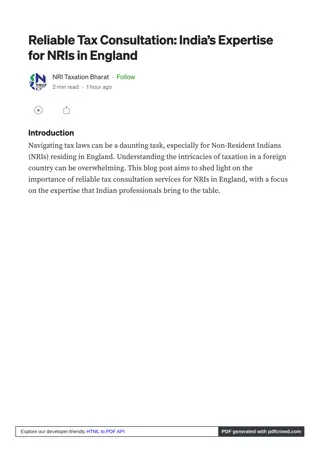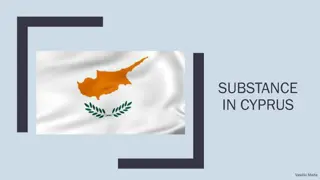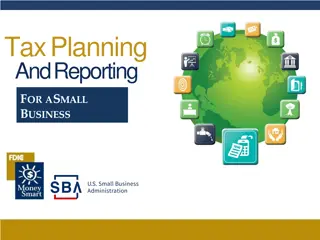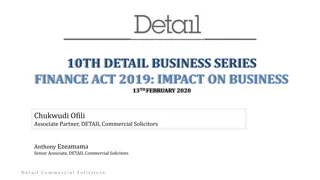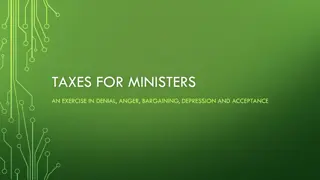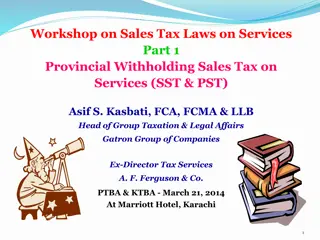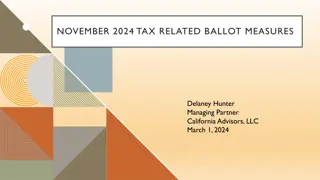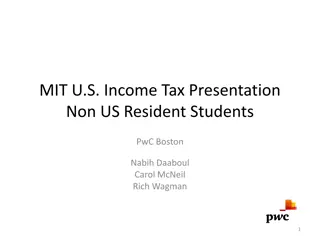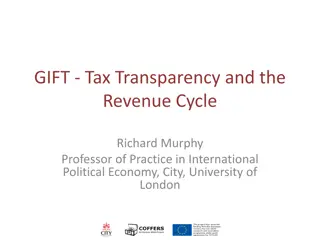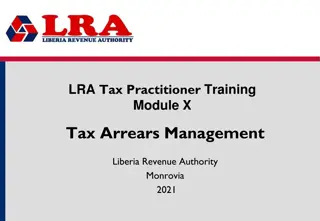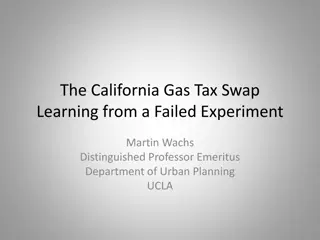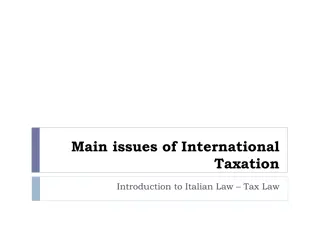Evolution of Local Tax Laws in California
Explore the history and evolution of local tax laws in California, starting from Proposition 13 in 1978 to Proposition 218 in 1996. Learn about the limitations, voter approval requirements, and impact on local revenue generation tools like fees and bonds.
Download Presentation

Please find below an Image/Link to download the presentation.
The content on the website is provided AS IS for your information and personal use only. It may not be sold, licensed, or shared on other websites without obtaining consent from the author.If you encounter any issues during the download, it is possible that the publisher has removed the file from their server.
You are allowed to download the files provided on this website for personal or commercial use, subject to the condition that they are used lawfully. All files are the property of their respective owners.
The content on the website is provided AS IS for your information and personal use only. It may not be sold, licensed, or shared on other websites without obtaining consent from the author.
E N D
Presentation Transcript
LOCAL FINANCE Timothy Bittle Steve Mayer David A. Carrillo Scott Reiber Darien Shanske
OVERVIEW History of tax evolution, cycle of initiatives and courts limiting them Broader context about local revenue-generating tools (fees and bonds) Buck s vision for maximum local autonomy (police power and muni affairs) Update on post-Upland cases and practical effects The counterpoint view arguing against using these options for revenue
HISTORY OF TAXES OVERVIEW History of tax evolution, cycle of initiatives and courts limiting them 1978: Proposition 13 added article XIII A to state constitution. 1986: Proposition 62 added 53720 53730 to Gov. Code. 1996: Proposition 218 added articles XIII C and XIII D to state constitution. 2010: Proposition 26 amended articles XIII A and XIII C.
HISTORY OF TAXES 1978: Proposition 13 added article XIII A to state constitution Sec. 1 capped property taxes at 1% of property s value (initially its purchase price in an open market, arm s length sale). Cap can be exceeded (with statutory limits) to pay: pre-13 voter-approved debt; post-13 bonds to acquire or improve property with 2/3 voter approval; or post-13 school bonds with 55% voter approval. Sec. 2 limits reappraisal of value to 2% annually, until a change in ownership. Sec. 3 allows Legislature to pass state taxes only with 2/3 approval in each house. Sec. 4 allows cities, counties and special districts to pass local special taxes (taxes for specific purposes) only with 2/3 voter approval. (Held not applicable to initiatives, but petitions for review pending.) Prop. 13 did not define taxes, causing years of litigation over taxes vs. fees.
HISTORY OF TAXES 1986: Proposition 62 added 53720 53730 to Gov. Code Required majority voter approval for local general taxes, but held inapplicable to charter cities.
HISTORY OF TAXES 1996: Proposition 218 added articles XIII C and XIII D to state constitution Expressly applicable to charter cities. Not applicable to developer fees or charges for electric or gas service. XIII C, sec. 2(b) No local government may impose a general tax unless submitted to the electorate at an election for members of the governing body and approved by a majority vote. XIII C, sec. 2(d) No local government may impose a special tax unless submitted to the electorate and approved by a two-thirds vote. (Held not applicable to initiatives, but petitions for review pending.) XIII C, sec. 3 Voters by initiative can reduce or repeal any local tax, fee or assessment. (Held not to include referendum power.)
HISTORY OF TAXES 1996: Proposition 218 added articles XIII C and XIII D to state constitution XIII D, sec. 4: Benefit assessments require an engineer s report apportioning cost of project to specially benefitted parcels, and a weighted election limited to parcel owners. XIII D, sec. 6(a): Property-related fees require mailed notice and a hearing to determine whether a majority of property owners (or tenants see Gov. 53755) submitted written protests. XIII D, sec. 6(b): Property-related fees can t generate more than needed to provide the service, can t be used for anything else, and can t exceed the cost attributable to the parcel. (Tiered rates OK, but must reflect costs. Capistrano Taxpayers Assn. v. San Juan Capistrano (2015) 235 Cal.App.4th 1493) XIII D, sec. 6(c) - Property-related fees other than sewer, water, and garbage require an election. (Does sewer include storm drainage? Compare HJTA v. Salinas (2002) 98 Cal.App.4th 1351 with Gov. 53751)
HISTORY OF TAXES 2010: Proposition 26 amended articles XIII A and XIII C Defines tax as any levy, charge, or exaction of any kind imposed by a local government, except: Reasonable charges for a specific benefit, privilege, service or product provided directly to the payor and not to those not charged; Reasonable regulatory fees for licenses, permits, investigations, inspections, and audits; Charges for entrance to or use of public property; criminal fines; developer fees; and property-related fees under art. XIII D, 6. Government s burden to prove that fees are not excessive, and are proportionate to payer s burdens on, or benefits from, the governmental activity.
NON-TAX REVENUE OVERVIEW Local revenue-generating tools (besides taxes) for addressing local agency budget shortfalls resulting from the pandemic. The distinction between taxes and fees Franchise fees Fees for use of government property Fees paid by municipally owned utilities Fees paid by private (i.e., public ) utilities The limits on these things as alternatives to general taxes (Remember that bonds exist)
NON-TAX REVENUE Franchise fees 2010 Prop. 26 defines a tax for purposes of Article XIII C as any levy, charge, or exaction of any kind imposed by a local government, subject to numerous stated exceptions. Exception: Article XIII C, Section 1(e)(2), which provides that tax does not include a charge imposed for a specific government service or product provided directly to the payor that is not provided to those not charged, and which does not exceed the reasonable costs to the local government of providing the service or product. Article XIII D, 6(b)(1) and (2): a city may not extend, impose, or increase a property-related fee or charge unless: Revenues derived from the fee or charge do not exceed the funds required to provide the property related service. Revenues derived from the fee or charge cannot be used for any purpose other than that for which the fee or charge was imposed.
NON-TAX REVENUE Fees paid by municipally owned utilities Howard Jarvis Taxpayers Assn. v. Roseville (2002) 97 Cal.App.4th 637 (invalidated transfer of 4% of utility s total budget to general fund) Howard Jarvis Taxpayers Assn. v. Fresno (2005) 127 Cal.App.4th 914 (invalidated fee of 1% of utility s fixed assets). Citizens for Fair REU Rates v. Redding (2018) 6 Cal.5th 1 (PILOT did not violate Prop. 26 where it did not increase rates because rates were insufficient to cover cost of service without PILOT). Humphreville v. Los Angeles (2020) 58 Cal.App.5th 115 (transfer of surplus from municipal utility to general fund not invalid where plaintiff conceded (to avoid the statute of limitations) that rates did not exceed cost of providing service). Wyatt v. Sacramento 2021 WL 302867 (upholds tax adopted by voters after Prop. 218 but before Prop. 26 requiring municipal utilities to pay 11% of gross revenues to general fund).
NON-TAX REVENUE Fees paid by private (i.e., public ) utilities Jacks v. Santa Barbara (2017) 3 Cal.5th 248 (invalidating 1% surcharge imposed by city on bills paid by customer of private utility, but holds that a charge imposed in exchange for franchise rights is a fee, not a tax, if reasonably related to the value of the franchise, and that fee may be used for any municipal purpose). Zolly v. Oakland (2020 47 Cal.App.5th 73, review granted Aug. 12, 2020). Must city franchise fees that are subject to California Constitution, article XIII C, be reasonably related to the value of the franchise? Mahon v. San Diego (2020) 57 Cal.App.5th 681 (undergrounding surcharge on bills constituted valid consideration for use of city streets and thus was not a tax for purposes of Proposition 218; fee was reasonably related to value of franchise because it was the product of bona fide negotiations).
DELVENTHAL DOCTRINE Buck Delventhal s conception of local government power Maximum possible local autonomy in general Article XI, section 7 police power for all cities Article XI, section 3 powers for charter cities Article XI, section 5(a) general municipal affairs clause Article XI, section 5(b) specific municipal affairs powers over city police force; subgovernment; city elections; and election, appointment, removal, and compensation of officers and employees
DELVENTHAL DOCTRINE Maximum local control over finance specifically Ex parte Braun: the power to impose taxes necessarily becomes a municipal affair. UC Regents: San Francisco has the constitutional power to raise revenue through taxes. This power is an essential attribute of its existence Cities win nearly every finance dispute with the state UC Regents: The only municipal tax case in which we have invalidated a city s assertion of the power to tax parties regulated by or doing business with the state is California Fed. Savings SCOCAblog: Since 1896, charter cities have won nearly every case that concerned local taxes, bonds, or employee wages and benefits: of the 29 such cases we identified, the city won 26 (90%).
WHY BUCK WAS RIGHT LOCAL TAXES ARE MUNI AFFAIRS THE INITIATIVE POWER IS SUPREME LOCAL INITIATIVE TAXES ARE MUNI AFFAIRS
DELVENTHAL DOCTRINE How this vision for local finance applies to today s challenges State budget looks better than expected, local budgets maybe not. Cities with maximal finance flexibility can address their budget shortfalls; cities lacking that power are dependent on state aid. How Buck s theory is reflected in the state of the law today He probably would agree that using initiatives to impose special taxes by majority vote is within a charter city s powers. The DCA opinions so far are adopting that view, drawing it from SCOCA s decision in Upland.
UPLAND Rationale for the 50% voting rule Longstanding judicial respect for the initiative power. But note that Upland is not limited to charter cities. And Prop 218 clearly does apply to charter cities. Because city authority in this area is so fundamental, courts are reluctant to apply Props 13/218/26 beyond their express terms. The clear statement rule identified by Upland: Requirement to find intentional limits on initiative power is consistent with longstanding respect for the initiative power. Ruling on the basis of the lack of a clear statement avoided the difficult problem of whether changes to the initiative power require a revision, not an amendment.
CASES FOLLOWING UPLAND San Francisco v. All Persons Interested in the Matter of Proposition C (2020) 51 Cal.App.5th 703 (two-thirds vote requirement for government- imposed special taxes does not apply to initiative). SF Nov 2018 Prop C 1DCA upheld voter-initiated special gross receipts tax for homelessness services; SCOCA denied review. Fresno v. Fresno Building Healthy Communities (2020) 59 Cal.App.5th 200 (follows and liberally quotes from All Persons). Fresno Nov 2018 Measure P 5DCA upheld voter-initiated special sales tax for recreation and arts; SCOCA review petition pending. Howard Jarvis Taxpayers Assn. v. San Francisco 2021 WL 265412 (follows All Persons and holds irrelevant board member s participation in the initiative process). SF June 2018 Prop C 1DCA upheld voter-initiated special commercial rents tax for childcare; SCOCA review petition not yet filed.
PENDING CASES SF June 2018 Prop G SF Superior upheld voter-initiated special parcel tax for SFUSD; awaiting oral argument in 1DCA (A160659). Oakland Measure AA Alameda Superior struck down voter-initiated special parcel tax for education; awaiting oral argument in 1DCA (A158977).
WHY THESE CASES WILL STAND Buck s view (reflected in Farrell) that supermajority voting requirements are inherently undemocratic and should therefore be interpreted narrowly. Add to that SCOCA s adoption of the clear statement rule for voter intent to impose limits on the initiative. And such limits raise some difficult questions: Can the state electorate limit the local initiative? Can either electorate limit its future power by amendment, or does that require a revision? If a future electorate ignores the limits, is that an implied repeal?
POST-UPLAND The voting rule is only one facet. Other issues remain open, for example: Incentives for using initiatives to generate local revenue vary by jurisdiction type: charter city v. general law city, urban v. rural, northern v. southern. Preemption and municipal affairs issues: what if a local tax initiative conflicts with state law, or another state constitutional provision? Can a state initiative reverse these cases? (probably not) Can a local initiative adopt a tax that the local government would be barred from imposing? (probably, see Bighorn 39 Cal.4th 205) Can local voters by majority vote repeal taxes previously imposed by the local government? Article XIII C section (3): the initiative can reduce or repeal any local tax, assessment, fee or charge.
POST-UPLAND As a policy matter: It is hard to justify the current jumble of local revenue powers. But a rough California paradigm that is at least roughly comprehensible may be emerging. The voters do not trust their representatives with taxes and so make it very hard for governments to raise taxes. Rather, the voters entrust that power to themselves and, at least sometimes, are prepared to raise taxes. Consider Props 30 and 55 at the state level.
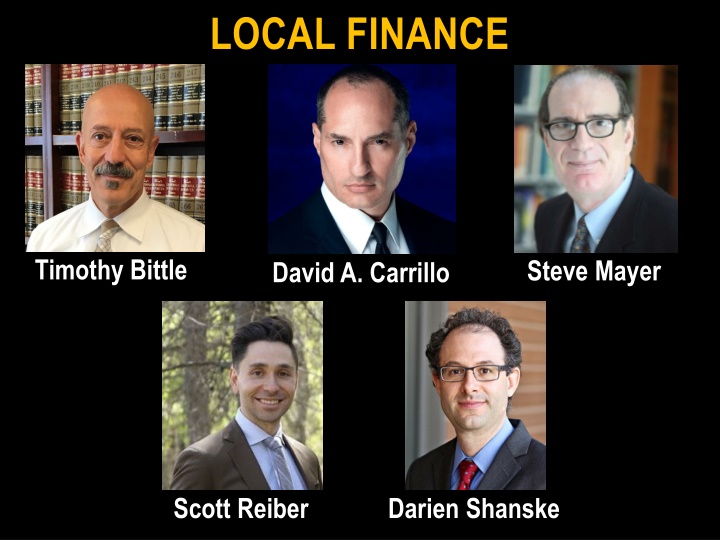

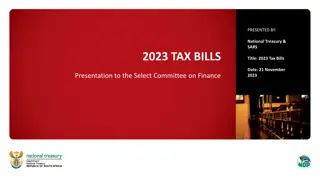

![Town of [Town Name] Real Estate Tax Rates and FY 2024 Budget Summary](/thumb/62211/town-of-town-name-real-estate-tax-rates-and-fy-2024-budget-summary.jpg)
